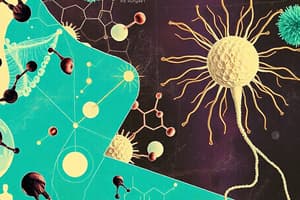Podcast
Questions and Answers
What is the primary function of the nucleus in a cell?
What is the primary function of the nucleus in a cell?
- Site of cellular digestion
- Site of protein synthesis
- Control center for biosynthesis of nucleic acids (correct)
- Powerhouse of the cell
Which organelle is known as the 'powerhouse of the cell'?
Which organelle is known as the 'powerhouse of the cell'?
- Mitochondria (correct)
- Endoplasmic Reticulum
- Ribosome
- Golgi Apparatus
What is the main role of the Golgi apparatus in cells?
What is the main role of the Golgi apparatus in cells?
- Protein synthesis
- Regulating cell membrane permeability
- Modification and packaging of proteins (correct)
- Energy production
How does the endoplasmic reticulum contribute to cellular function?
How does the endoplasmic reticulum contribute to cellular function?
Which cellular component is involved in intracellular digestion?
Which cellular component is involved in intracellular digestion?
What defines a virus as an infectious agent?
What defines a virus as an infectious agent?
Which component of a cell regulates the entry and exit of materials?
Which component of a cell regulates the entry and exit of materials?
Which organelle is primarily responsible for the synthesis of cell proteins?
Which organelle is primarily responsible for the synthesis of cell proteins?
Which type of cell organization refers to organisms composed of many cells?
Which type of cell organization refers to organisms composed of many cells?
What defines biochemistry?
What defines biochemistry?
What characterizes the biochemical systems of life?
What characterizes the biochemical systems of life?
Which is NOT one of the principal areas of biochemistry?
Which is NOT one of the principal areas of biochemistry?
What unique ability do living organisms possess regarding their molecules?
What unique ability do living organisms possess regarding their molecules?
Which statement accurately describes metabolism?
Which statement accurately describes metabolism?
How do living organisms typically obtain energy?
How do living organisms typically obtain energy?
Which characteristic is NOT typical of living matter?
Which characteristic is NOT typical of living matter?
What does genetic biochemistry specifically study?
What does genetic biochemistry specifically study?
Which of the following best describes lifeless molecules in living organisms?
Which of the following best describes lifeless molecules in living organisms?
Flashcards are hidden until you start studying
Study Notes
Definition of Biochemistry
- Study of the chemistry of living organisms, emphasizing the transformation of lifeless molecules into life-supporting substances.
- Lifeless molecules maintain life when organized in specific structures within living organisms.
- These molecules adhere to physical and chemical laws governing matter but also exhibit unique interactions.
Principal Areas of Biochemistry
- Structural Chemistry: Examines the structure of biological components and their relationship to function.
- Metabolism: Encompasses all chemical reactions occurring within living organisms.
- Genetic Biochemistry: Investigates processes and substances vital for storing and transmitting genetic information, intersecting with molecular genetics.
Characteristics of Living Matter
- Biologically complex yet highly organized structures.
- Organisms extract, transform, and utilize energy, primarily from nutrients or sunlight.
- Capable of precise self-replication and self-assembly.
Molecular Logic of Life
- Refers to the principles guiding the interactions and functions of biomolecules.
- Fundamental objective of biochemistry is to explore how molecular interactions sustain life.
The Cell
- Cells are the basic structural and functional units of all living organisms.
- Living organisms can be unicellular (single-celled) or multicellular (many-celled), performing specialized functions.
- All cells share common features that facilitate diverse roles.
Bacterial Cell Structure
- Unique components and structures specific to bacterial cells, enhancing their functions.
Functions of Organelles
- Nucleus: Central hub for biochemical processes; primary site for DNA and RNA biosynthesis, acting as control center.
- Nucleoli: Ribosome-rich areas active in the synthesis of protein and RNA.
- Ribosomes: Sites for protein manufacturing; facilitate information transfer from DNA to protein.
- Endoplasmic Reticulum (ER): Main cellular machinery separating newly synthesized molecules; includes:
- Rough ER (RER): Involved in protein synthesis and RNA processing.
- Smooth ER (SER): Responsible for lipid synthesis.
- Mitochondria: Energy powerhouse of cells; site of oxidation reactions and electron transport chains.
- Lysosomes: Key sites for intracellular digestion, can lead to cell rupture if malfunctioning; act as defense mechanisms.
- Golgi Apparatus: Functions as a packaging and modification center for proteins and carbohydrates; manages cellular transportation.
Cell Membrane
- Regulates the entry and exit of substances in cells; acts as a selective barrier.
Viruses
- Infectious agents characterized by small size and simple structure, capable of replication only within living cells of organisms like animals, plants, or bacteria.
- The term "virus" is derived from Latin, meaning "slimy liquid" or "poison."
Unique Role of Carbon in Biochemistry
- Carbon is fundamental for constructing biological molecules, forming the backbone structure for various functions.
Elements Essential for Life
- Identification of key elements necessary for sustaining life, contributing to biochemical processes.
Common Functional Groups of Biological Molecules
- Various functional groups play critical roles in the chemical behavior and interactions of biological molecules.
Biological Molecules and Functional Groups
- Typically, biological molecules are characterized by the presence of multiple functional groups, enhancing their chemical diversity and functions.
Studying That Suits You
Use AI to generate personalized quizzes and flashcards to suit your learning preferences.




